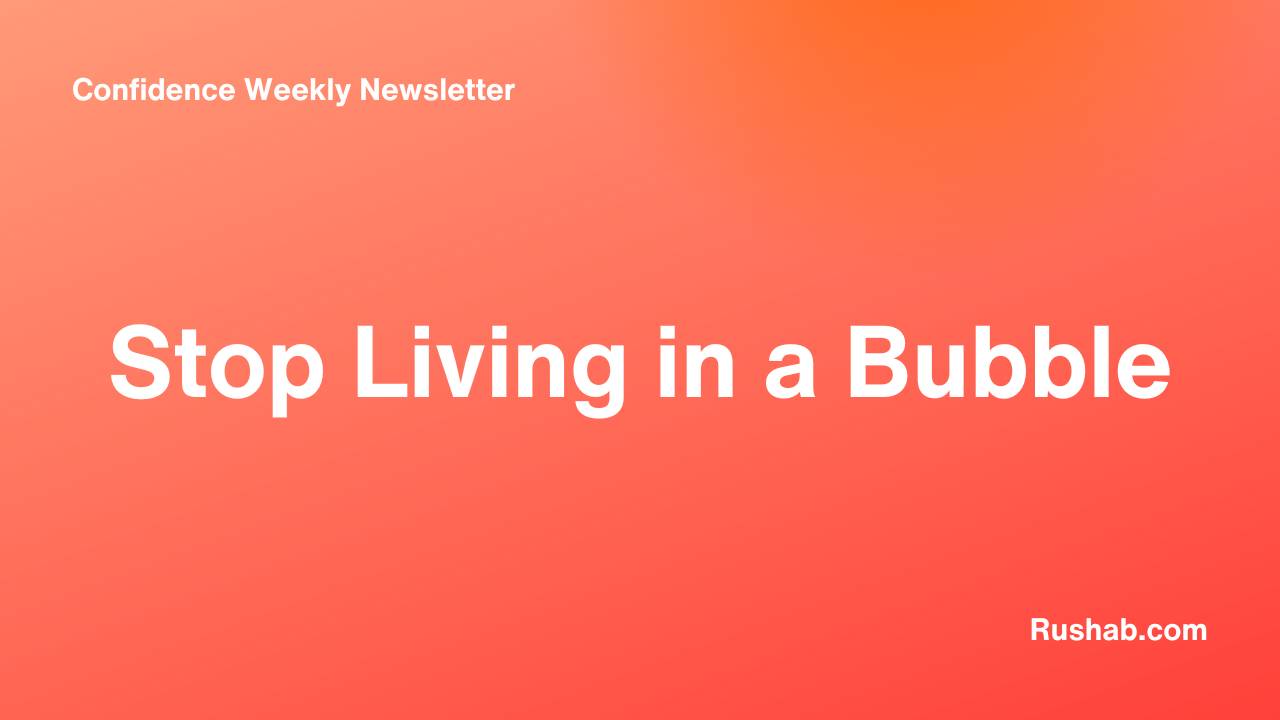Stop Living In a Bubble
Mar 30, 2025
Stop Living In a Bubble
Some celebratory news to kick things off, this is the 52nd issue of The Confidence Weekly Newsletter! That means you’ve received one newsletter every single week for the past year, each one focused on helping you build self-confidence.
Writing this newsletter has been a learning journey for me. I've tweaked the format, adjusted the tone, and continue to refine my voice in this space. Is it perfect? Not yet. But that’s part of the process.
What matters most is consistency and a willingness to evolve. Throughout this journey, I’ve actively sought feedback and data to improve, rather than staying in a bubble of “feel-good” assumptions.
This is a perfect segway into today's topic: Stop living in a bubble.
Let's Talk Bubbles
Most people don’t know they’re in a bubble. That’s kind of the problem. It feels normal because everyone around you thinks like you, talks like you, believes what you believe. Maybe it’s your industry, your social circle, your culture, your favorite YouTube algorithm. But over time, this bubble reinforces your views and gently pushes out anything unfamiliar.
The danger? You start to mistake that bubble for the world.
Do You Live In a Bubble?
Here’s a quick check.
- When was the last time someone challenged your opinion and you actually listened?
- How often do you seek out conversations with people who think differently than you?
- Do you mostly read/watch/follow content that confirms what you already believe?
If you're answering “not really” to any of those, don’t feel bad. Most of us build our lives to be efficient, not expansive. We surround ourselves with familiarity because it's easier. But here’s the catch: comfort kills growth.
The Risk of Living in a Bubble
Living in a bubble can give you a false sense of confidence. According to a 2022 study published in Nature Human Behaviour, people exposed only to like-minded opinions often report higher confidence in their beliefs - even if those beliefs are objectively incorrect. Confidence goes up, but accuracy? Not so much.
It’s what psychologists call “epistemic closure.” You start to close off new ideas, thinking you already know enough. That can be dangerous in your career, relationships, and especially in leadership roles.
On the flip side, some people in bubbles experience the opposite effect: low confidence. Why? Because if you’ve never seen someone do something differently and succeed, you start to believe your way is the only way. And if you don’t fit that mold, you feel like you’re behind or inadequate.
Either way - false confidence or insecurity - you lose.
Why a Broader Persepctive Matters
When you break out of your bubble, your world expands. You become more curious. You start asking better questions. You see patterns others miss. You understand people better. You lead better.
In a 2023 McKinsey report, teams with higher cognitive diversity were shown to be 33% more likely to outperform their peers in problem-solving tasks. Not because they were smarter - but because they had more perspectives in the room.
The same applies to individuals. The more perspectives you’re exposed to, the better your decisions, your empathy, and your creativity. It’s like upgrading from dial-up to fiber. Everything just works better.
How To Avoid The Bubble Mentality
Here are a few small but powerful habits you can try:
- Talk to people outside your industry. Cross-pollination of ideas is where innovation lives.
- Read outside your norm. If you’re into tech blogs, read some philosophy. If you love self-help, dip into economics.
- Ask more than you assert. Lead with curiosity, not conclusions.
- Travel if you can. Or watch documentaries about places and people you don’t understand.
- Audit your information diet. Follow at least 2 people who respectfully disagree with your worldview.
It’s not about agreeing with everyone. It’s about being open to learning from anyone.
Parting Words
The people I respect most aren’t the ones who “know everything.” It’s the ones who say, “I’ve never thought about it that way.” That kind of humility and openness is magnetic. It builds trust. It builds growth. And, ironically, that’s what real confidence looks like—not arrogance, but curiosity.
So here’s my gentle nudge: pop the bubble. Not with shame or guilt, but with excitement. There’s a bigger world out there. And it’s got a lot to teach you.
Until next time, keep learning and keep growing.
Have a great beginning to your week!
Thought Of The Week
A weekly thought to meditate, ruminate, and/or ponder on:
"The greatest enemy of knowledge is not ignorance, it is the illusion of knowledge."
- Stephen Hawking
If you are interested in improving your interviewing, communication and confidence skills, schedule a call with me or learn more about my coaching here. And if you haven’t yet, subscribe to The Confidence Weekly Newsletter here.
Want articles like this in your inbox every Sunday morning?
Subscribe here. Don't worry, your information will not be shared.
We hate SPAM. We will never sell your information, for any reason.

